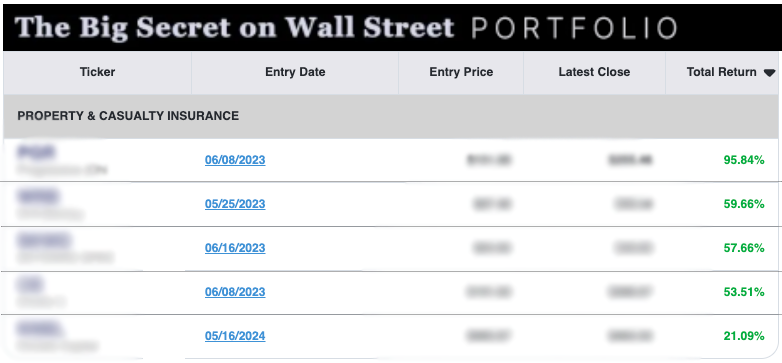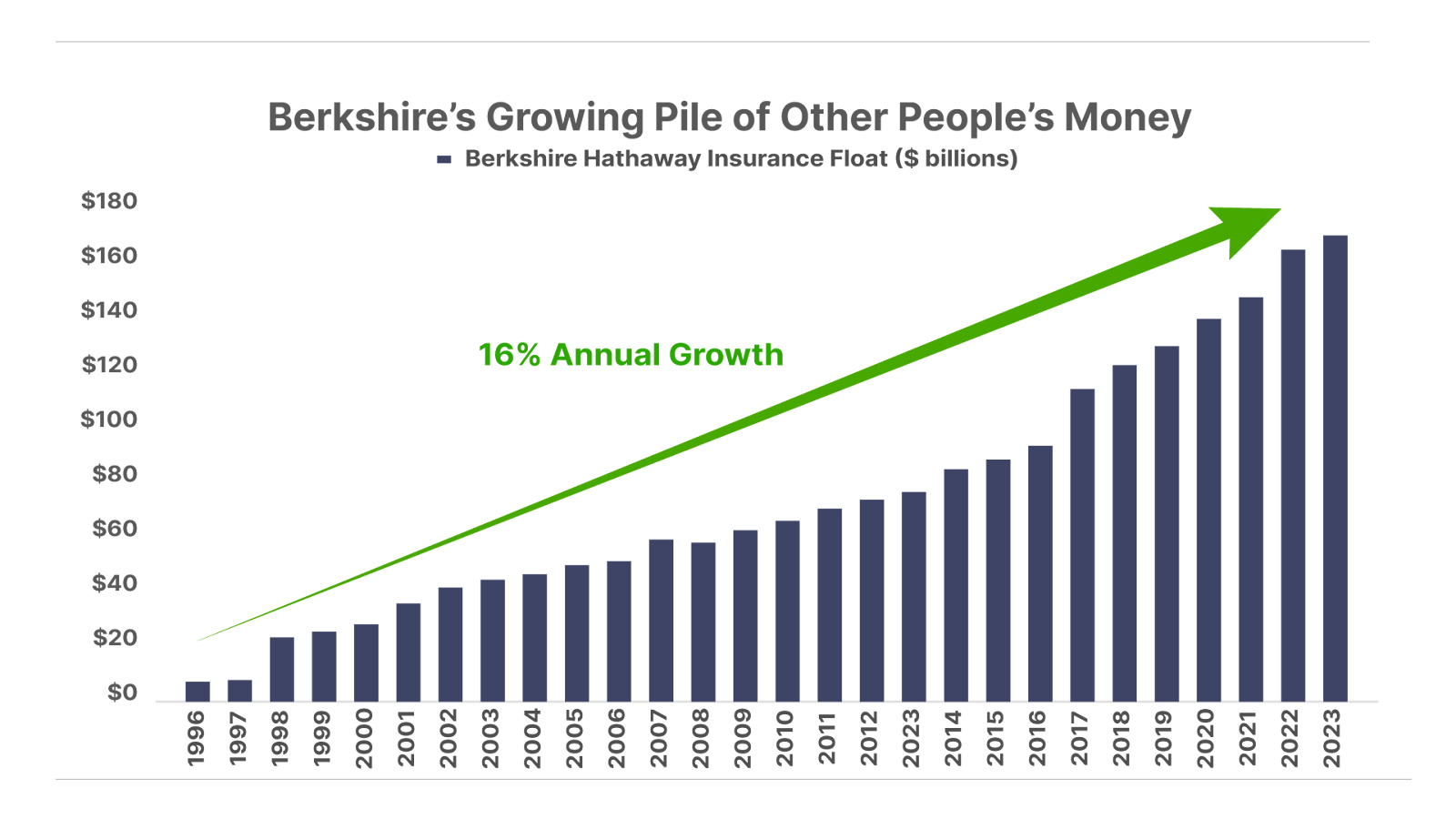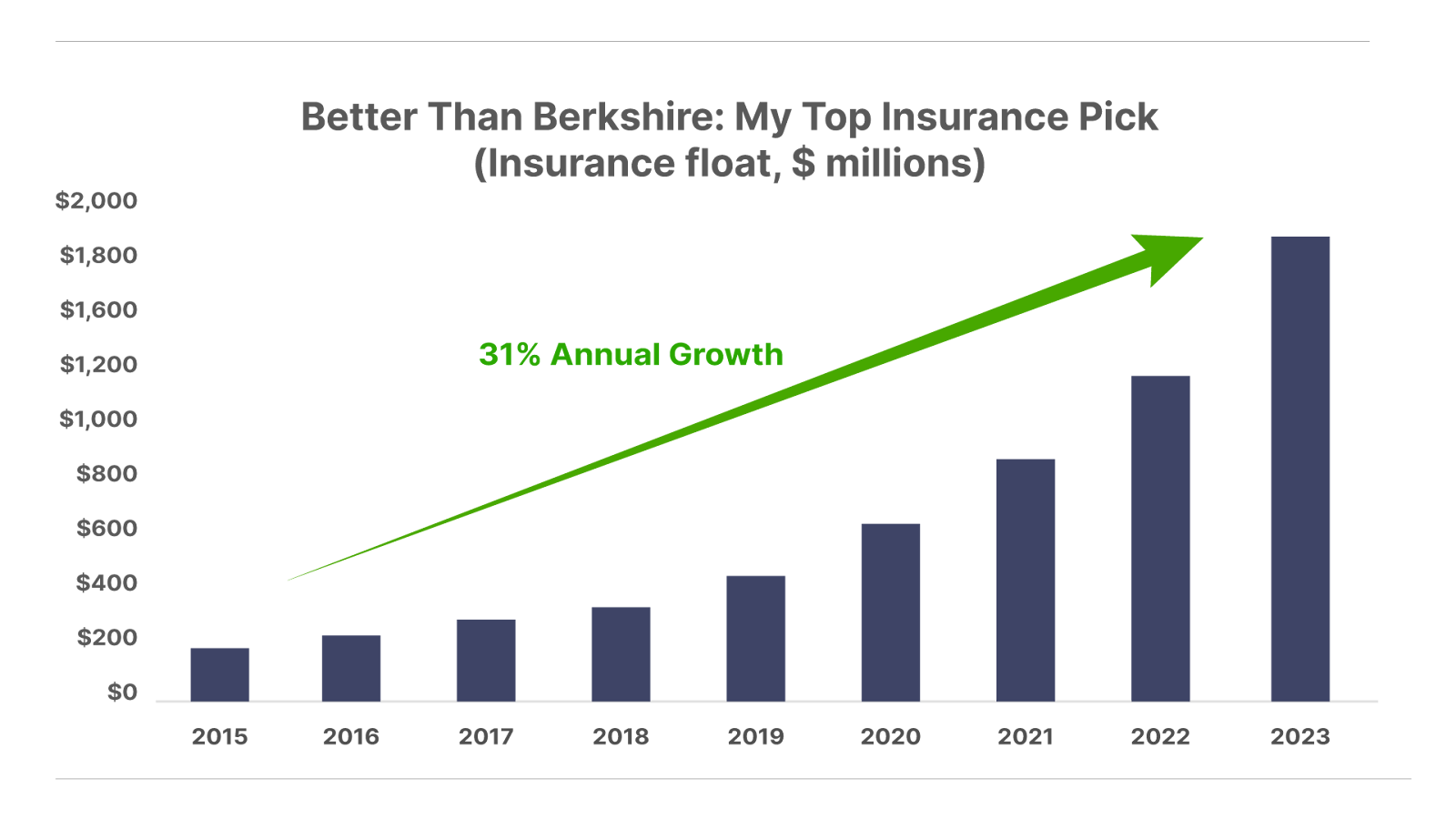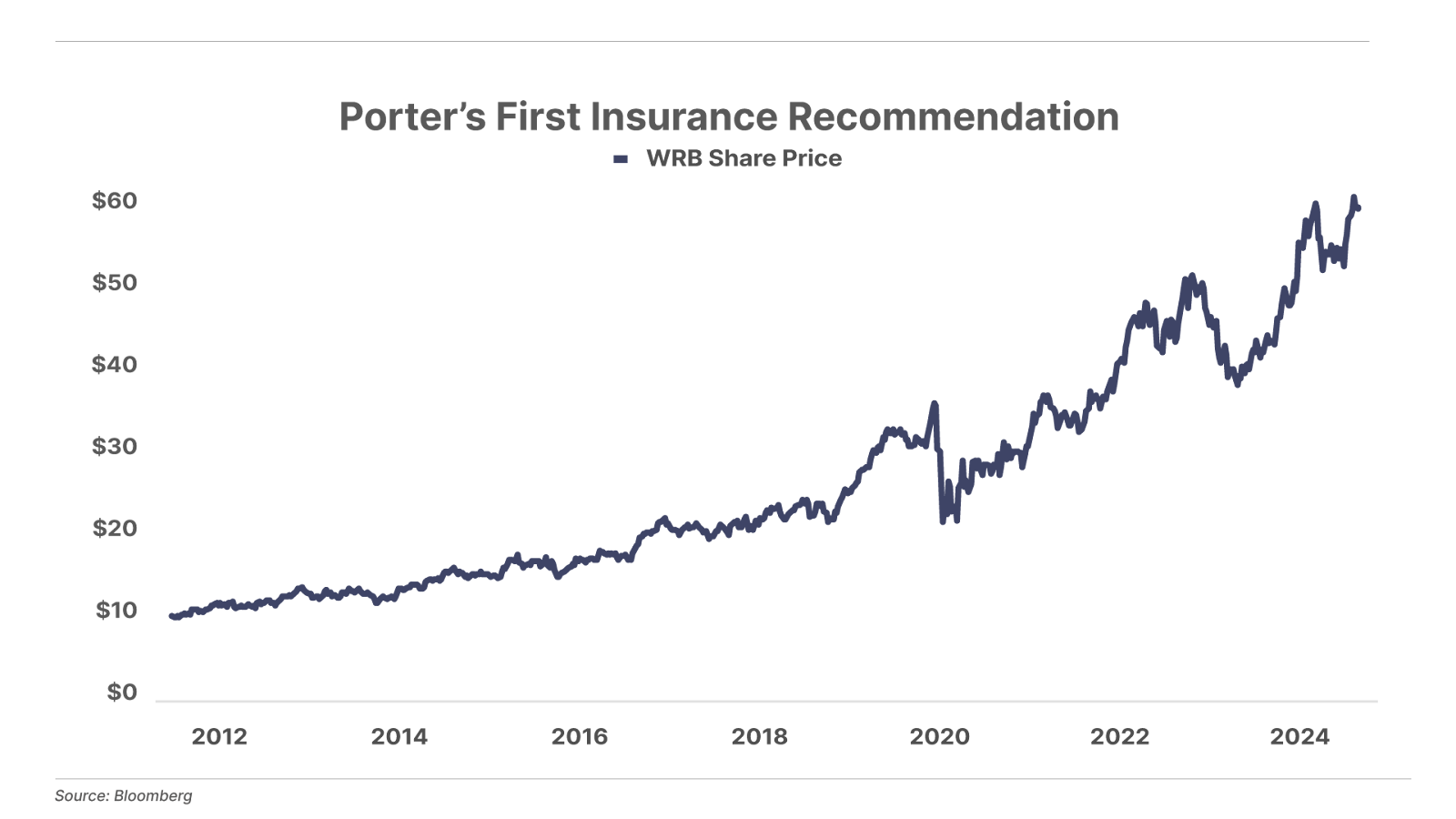Issue #4, Volume #1

The Beauty of Property and Casualty Stocks
Three Things You Need to Know:
1. Seems like nothing can stop this stock market. The S&P 500 and the Dow Jones Industrial Average are within a whisper of new all-time highs (and the Nasdaq Composite Index isn’t far behind) – despite deepening signs of recession… out-of-control deficit spending… and another assassination attempt on former President Donald Trump. Clearly, stocks (and investor sentiment toward them) are pretty resilient. But it’s a lot more than that. The continued strong performance of shares is another sign of how paper money is taking over the economy: In this inflationary economy, bonds aren’t safe – and neither is holding cash. Stocks are the only game in town.
2. Stocks are expensive… By nearly every measure. With so much money flowing into stocks despite a deteriorating macroeconomic environment, it’s not surprising that major indexes are in nosebleed territory. A Bank of America analysis shows that the S&P 500 is expensive – that is, well above long-term historical averages – in 19 out of 20 key valuation metrics. Total market capitalization divided by GDP (Warren Buffett’s favorite parameter) is higher than at any point since data has been kept, starting in 1964, nearly 2.5x the average… and the Shiller P/E, a smoothed, long-term price-to-earnings multiple, is double its long-term average.
3. Eating out is becoming a luxury for many Americans. While the wealthy are sheltering their assets from inflation in the stock market, the average American is getting wiped out, as his wages, cash savings, and standard of living are inflated away. The National Restaurant Association’s Restaurant Performance Index (“RPI”) tracks the health of U.S. restaurants via same-store sales, traffic, labor, and capital expenditures. The index declined 1.3% in July, to 97.7, representing its 10th consecutive month under 100, indicating a period of contraction. Only the 2008 Great Financial Crisis and the 2020 COVID lockdowns have seen similar levels of sluggish performance in this index. If only socialism had a value menu…

And also…
Early data on iPhone 16 sales suggests demand is weak. One analyst estimates that pre-orders for Apple’s (AAPL) newly released iPhone 16 came in at 37 million over the weekend – which is 12% less than the opening weekend for last year’s iPhone 15. The new phone’s disappointing debut casts doubt on hopes for an upgrade supercycle – an extended period of demand many investors anticipated might reverse a trend of sluggish iPhone sales growth in recent years. With all but the wealthiest consumers struggling with escalating costs throughout the economy, Apple shares – trading at a near decade-high valuation of 32x earnings – remain vulnerable to further disappointment from mass-market buyers balking at the $1,000-plus price tag for the latest iPhone models.
| Editor’s note: On Friday, Porter talked about his personal evolution as an investor… from going on global Easter-egg hunts with others looking for distressed opportunities to buying and holding world-class businesses… He explained Lindy’s Law and how it applies to one of Warren Buffett’s all-time greatest investments… and he concluded by discussing the sector that accounts for some of his own best investment recommendations. Today, he picks up from there… |
The Casino That Is Rigged for You
If you look at our recommendations for The Big Secret on Wall Street, you’ll see that the best and most consistent segment of the portfolio is our property and casualty (P&C) stocks, with five positions, all of which are beating the market by a wide margin.

Therein lies what I believe is a proven secret to successful investing. It’s a very simple idea. I’ll explain it to you this way.
Let’s say we were both going to a broken casino – where, instead of having games that were rigged to always beat you over time, the games were rigged to give you a slight advantage over time. In other words, as long as you simply played long enough, you would win on most of the games. Different games offered different odds, with some producing better results than others, but on almost all of them, customers would over time wind up winning rather than losing.
Do you think you’d do better by studying exactly which games offered the best odds, and just playing those? Or do you think you’d do better by focusing on borrowing as much money as you possibly could to invest in the games that you knew were winners, even if they didn’t offer the very best odds? The bigger your bankroll, the more you could win. Then, all you’d need to do is determine that the game you’re playing is definitely a winning game, and put as much money as you can into it.
Of course, if you borrow the money, you have to pay interest and, if there’s a drawdown in your account, you could lose everything to a margin call. But what if, instead of borrowing the money, you used other people’s money? That is, if you collected insurance premiums, then you could get all of the capital you needed for free, as long as you did a good job at pricing the risks.
That is, in effect, exactly what Warren Buffett has done at Berkshire Hathaway (BRK), and why he has been able to produce so much wealth, over such an extended period.
He figured out what kinds of companies were certain to produce good returns – See’s Candies, Coca-Cola (KO), American Express (AXP), Apple (AAPL) – and then he went out and got billions and billions of other people’s money to invest. He got this money not by (say) launching a hedge fund – but rather, by becoming the world’s best P&C holding company, buying up “float” with his purchases of Geico, National Indemnity, General Re, Allegheny, and others.
The float is the money people have paid in premiums that the insurance industry holds to pay for claims. While the industry as a whole pays out more in claims than it collects in premiums, there are some companies that nearly always pay out less. These firms – well-run, high-quality underwriters – can therefore gain access to huge amounts of capital, for free. Investing this float wisely creates a virtually perpetual money machine, which, over time, can produce stupendous amounts of wealth.
For example, the size of Berkshire’s float has grown by 16% a year since 1996, from $7 billion to $169 billion! Tack on even modest investment gains, and you are going to produce 20% returns, for decades. And that is exactly what Buffett has done. He was never trying to maximize his equity returns: he was investing the float, which meant all he had to do was make sure he wasn’t going to lose money.

In fact, hedge fund AQR Capital Management analyzed Berkshire’s results in 2013 and found that the impact of using all of that insurance float was the same as leveraging the Berkshire equity portfolio 6x.
While you may not be able to buy up billions in float directly, like Buffett, you can invest directly in well-run P&C businesses with proven underwriting expertise that are growing their float at rates that are 2x or 3x average equity returns. When you do that… for any reasonable period of time… you’re going to generate an enormous amount of wealth.
Gee, Porter… where would I find a list of stocks like that?
Well, we did just recommend the very best P&C stock I have ever reported on (see the May 17, 2024, issue of The Big Secret on Wall Street). This company’s float is growing by 30% a year. And we expect this to continue for at least the next 20 years.

There’s no doubt in my mind that this stock will be the best recommendation that I will ever make in my career.
And, yes, I own shares. So, I might be biased. But, if you really want to build wealth as an investor, this is the way. Let’s all get together in 20 years (at the MarketWise Fellowship… see below) and celebrate.
How could the progression of my top insurance stock pick unfold?… I’d look to W.R. Berkley (NYSE: WRB), which was the first P&C insurance company I ever recommended, back in 2012, when I first began to understand the capital efficiency and resulting compounding returns that were possible in P&C companies. And, then, of course there’s WRB’s incredible founder and its founder-led culture of performance. WRB shares are up 515% since I first recommended the stock.

I urge you to put up to half of your portfolio into our P&C recommendations. To see all the details of our P&C recommendations and to get access to our industry report The World’s Greatest Investment: Guide to P&C Insurance Investing, please consider becoming a subscriber to The Big Secret on Wall Street by clicking here, or by just calling Lance James, our Director of Customer Care, at 888-610-8895 or (internationally) +1 443-815-4447.
And, as always, don’t hesitate to tell me what you think! Reach me directly at [email protected].
Good investing,
Porter Stansberry
Stevenson, MD
P.S. I want to share one last thing before we end today. It’s a special invitation to The Fellowship, which I mentioned above…
I have always wanted to bring our readers together in a way that’s never been done before – a way that allows us to connect on a deeper, more intimate level.
That’s what The Fellowship is all about…
The Fellowship is a group that creates unforgettable memories together.
Because while we talk primarily about finance, investing, and building wealth, that’s only part of what life is really about… Life is about connecting and building memories.
So, if you do one thing today, or even this week or this month, on behalf of your health, wealth, and happiness – I urge you to check out this offer I recently made.
It’s an invitation to join me in this new project and enjoy special access to just about everything I have access to…
Exclusive access to rental properties, hotel groups, golf clubs, personal clothing consulting, the list goes on and on…
You’ll have the world’s leading authorities on gold coins and collectibles, plus second passports at your disposal…
All the details are right here.